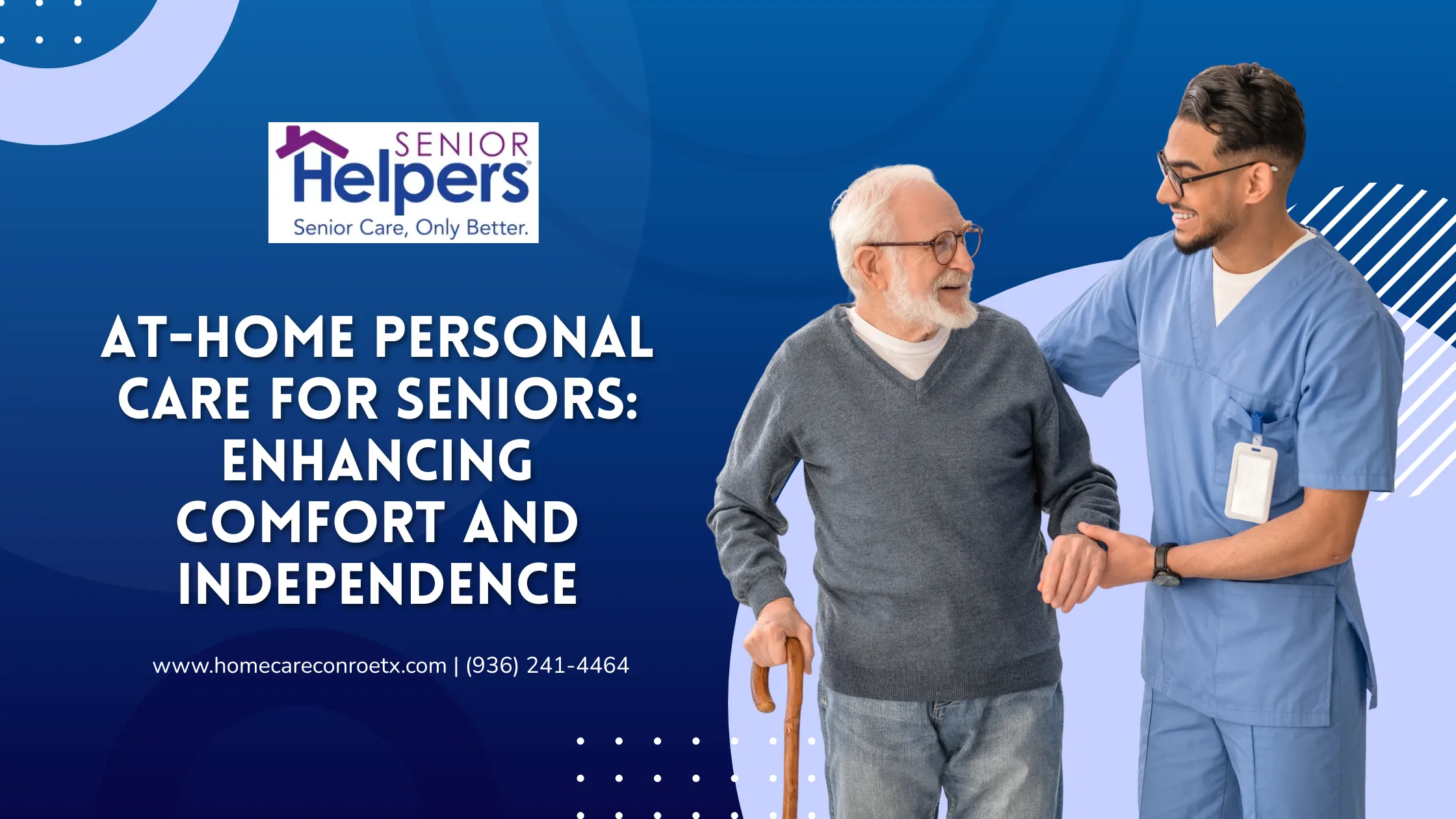Supporting a senior’s comfort, safety, and independence often begins at home, not in a facility. More families across Texas are turning to at-home personal care for seniors as a practical solution that protects dignity and promotes well-being.
But how do these services truly help? And when should you consider them for someone you love?
Let’s break it down clearly and simply.
What Caregivers Really Do to Help Seniors Thrive
When we talk about in-home personal care assistance, we’re talking about everyday tasks that preserve independence.
This includes help with:
- Bathing, grooming, and hygiene routines
- Getting dressed safely and comfortably
- Transfers from bed or chair
- Toileting and continence support
- Preparing meals and assistance with eating
Rather than taking over, caregivers work alongside seniors to support what they can do, not replace it.
Alt tag tip for imagery: In-home caregiver helping senior prepare a healthy meal in a Texas home.
Independence Means More Than Just Being Alone
Seniors who stay in their homes often feel more confident and emotionally secure.
Here’s why:
- They choose their routine
- They maintain privacy
- They interact in familiar surroundings
- They retain control over how and when they receive help
With the right support, senior care at home becomes a bridge to freedom, not a limitation.
When Family Burnout Becomes Too Much
Caring for someone you love is deeply meaningful. But the demands are real.
That’s why bringing in a trusted professional helps relieve pressure:
- You stop juggling too many roles
- You regain your own time and energy
- You feel reassured knowing your loved one is in good hands
Need short-term help or a break? Consider our respite care options to give yourself a breather without compromising care quality.
Conditions Don’t Have to Define Quality of Life
Chronic illness doesn’t need to force a move to a facility. Seniors living with diabetes, Parkinson’s, or other diagnoses can still enjoy a safe home life.
Services like Parkinson’s Care and Chronic Disease Support are built to help clients manage symptoms, prevent complications, and stay in control.
Instead of adjusting life around disease, we adjust care around life.
A Day in the Life: Flexible Routines That Fit
Care at home molds to the rhythm of the senior’s preferences.
Here’s how a supportive daily routine might flow:
- Morning: Assistance with hygiene, dressing, and breakfast
- Afternoon: Housekeeping tasks, medication reminders, companionship
- Evening: Preparing dinner, light mobility support, evening wind-down
Want a highly tailored plan? Concierge Care services offer advanced personalization based on lifestyle, needs, and goals.
More Than Physical Help — Emotional Care Counts Too
Many seniors in Texas feel isolated, especially if family lives far away. But connection isn’t optional, it’s a lifeline.
Our Companion Care services give clients someone to talk to, laugh with, and spend time with. These relationships build trust, reduce depression, and make each day more meaningful.
When Hospital Recovery Needs a Gentle Transition
Post-surgery care at home can reduce complications and promote quicker healing.
Through Comprehensive Return Home Care, seniors receive:
- Help with discharge instructions
- Support attending follow-up appointments
- Medication adherence and home safety monitoring
For families navigating terminal illness, our End-of-Life Support ensures dignity, peace, and comfort at every stage.
A Real-Life Example: Recovery at Home
We recently helped a family in Conroe whose father was discharged after hip surgery. He was nervous about mobility and falls, and his daughter was balancing work and caregiving.
With our daily support from transfers to dressing and meal prep, he regained confidence, stayed out of the hospital, and felt safe every step of the way.
This is what practical, respectful in-home support can do.
Early Warning Signs You Shouldn’t Ignore
Wondering when to get help? These signs often mean it’s time to explore personal care services at home:
- Missed meals, skipped medications
- Difficulty moving safely
- Worsening hygiene
- Memory lapses
- Loss of interest or isolation
Thousands of families have already found peace of mind. See what others are saying on Senior Helpers’ local Google listing
How to Get Started: Simple, Stress-Free Process
Not sure what to do next? We make it easy.
Here’s how it works:
- Contact us by phone or through our online form
- Schedule a free in-home consultation
- Choose your care plan based on your needs and budget
We’ll walk with you every step of the way.
Financial Support and Benefits
Worried about cost? We’ll help you explore options like:
- VA benefit programs
- Medicaid waivers
- Private-pay flexibility
Visit our VA Benefit Assistance page to learn more about support you may qualify for.
FAQs: Quick Answers About Personal Care at Home
What is personal care for seniors at home?
It includes assistance with hygiene, mobility, dressing, meals, and overall daily routines to help seniors stay safe and independent at home.
How can I tell if my parent needs in-home help?
Look for signs like weight loss, skipped medications, confusion, poor hygiene, or frequent falls.
Are personal care services customized?
Yes. Each care plan is tailored based on medical conditions, preferences, lifestyle, and family input.
Can at-home care work for someone with dementia?
Absolutely. Our in-home nursing care services support Alzheimer’s and dementia-related needs.
What if my loved one refuses help?
It’s normal for seniors to feel hesitant. Our caregivers are trained to build trust gently. Most clients feel more comfortable once they experience respectful, supportive care.
You’re Not Alone. We’re Ready When You Are
If you’ve noticed changes or feel overwhelmed, now is the time to act. Personalized, in-home support offers dignity, peace, and relief for everyone involved.
Visit our Personal Care page to take the first step toward dependable, respectful help at home.
You don’t have to do this on your own. Let’s find the right solution together.



